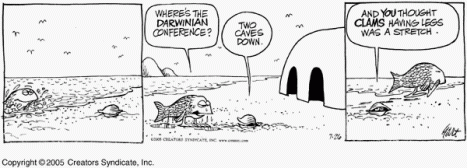With a title like “Minister of State for Science and Technology”, it’s no wonder that Gary Goodyear thinks acceptance of evolution should be a matter of religious conviction. When asked about evolution, Gary had this to say:
“I’m not going to answer that question. I am a Christian, and I don’t think anybody asking a question about my religion is appropriate,”
Mr Goodyear eventually clarified his position, when he realized how many people this upset:
“We are evolving every year, every decade. That’s a fact, whether it is to the intensity of the sun, whether it is to, as a chiropractor, walking on cement versus anything else, whether it is running shoes or high heels, of course we are evolving to our environment. But that’s not relevant and that is why I refused to answer the question. The interview was about our science and tech strategy, which is strong.”
Notice he never acknowledges macroevolution, only microevolution. Clever…a lot of people will miss that. If I were able to ask Mr. Goodyear one question, it would be this: “Is clinical acupuncture based on science or religion?”.
As a chiropractor who specialized in acupuncture, my guess is that he would say “Science”, even though the field is still heavily dependent on traditional Chinese metaphysics. While I’d be the first to accept that traditional methods of finding truth and value are important, I’d be the first challenge a statement that these sorts of things are scientific. By definition, they are not.
It’s not that controversial to label accupuncture a pseudoscience, though it has well demonstrated effects on pain. In its current formulation it’s pretty much based on Qi, (pronounced chee) “flows of energy” that are around and in all living things. While I’m not going to debate whether or not something like this exists (I think it does), these flows are not quantifiable, we haven’t observed them, and we can’t make any predictions based on them.
While acupuncture seems to work, we can’t claim to know HOW it works. Qi is undoubtedly philosophy, and as far as accupuncture relies on Qi it is simply eastern philosophy and pseudoscience.
But is EVOLUTION pseudoscience? There is consensus on this in the scientific community; and that is “No, evolution is NOT pseudoscience. And stop calling it ‘Darwinism’!'” They would know, and they can back it up. It’s science!
Like Gary, I was taught that belief in Darwinism was a matter of religious or philosophical conviction. And I accepted that at first, until I really started researching the matter. What I found stunned me; evolution was undoubtably scientific. It’s observable right now as well as forensically, it’s quantifiable (expressed algorithmically), and it makes predictions about the world that can be verified. And those predictions HAVE been verified, over and over again, to the point where it’s a contender for one of the “superb” scientific theories, right below general relativity and the standard model of quantum mechanics.
“Into the SUPERB category must go all those I have been discussing in the paragraphs preceding this one [that is, relativity – both varieties – and quantum mechanics]. To qualify as SUPERB, I do not deem it necessary that the theory should apply without refutation to the phenomena of the world, but I do require that the range and accuracy with which it applies should, in some appropriate sense, be _phenomenal_. The way that I am using the term `superb’, it is an extraordinary remarkable fact that there are any theories in this category at all! I am not aware of any basic theory in any other science which could properly enter this category. Perhaps the theory of natural selection, as proposed by Darwin and Wallace, comes closest, but it is still some way off.” Penrose in “Emperor’s New Mind” (Highly recommended!)
Even as general relatively and quantum mechanics do, evolution has problems. There are BIG, glaring holes in it, as there is in EVERY SINGLE scientific theory. But that’s not why Mr. Goodyear doubts macroevolution. Mr Goodyear has inadvertently made it plain he doubts evolution because of his religious beliefs. IE; he believes that Genesis is literally true, to one degree or another. He’s probably a creationist. And not the Roman Catholic kind; the Protestant kind.
I can find no reasonable response for this, as creationism is not subject to reason. But as Canada’s minister of science, Mr. Goodyear does not have the right to misrepresent science because of his personal religious views. Biology and genetics are INCREDIBLY important fields of study right now, and he does his country a great disservice to ignore the advances evolutionary theory has brought to these fields. If he must take this on faith, so be it; but his actions are important.
Furthermore, by making scientific claims based on religious values, he weakens his ability to make MORAL claims about science, which is where personal morality, ethics, and spirituality/religion are unquestionably important! To be more clear, one shouldn’t say they don’t believe in atomic fission because of their nonscientific convictions. That’s useless, it’s just burying your head in the sand. Instead, say that you don’t believe in atomic BOMBS because of moral, ethical and/or religious conviction!
Or DO believe in bombs, but you get my point, the decision what to do with technology and the meaning of life are more propoer fields for metaphysics and theology than the existence or nonexistence of specific scientific phenomenon.
To apply this to the theory of evolution. One should accept that natural selection is a fact, if the word “fact” is to mean anything. Besides, unless they are an evolutionary biologist, their opinion doesn’t mean squat anyway! We can certainly say religious conviction has NOTHING to do with the factual truth of scientific theories.
Instead, Goodyear could affirm science, while affirming God as the Primary Mover and the ultimate source of meaning. Instead he culd say, “Regardless of scientific facts, I believe God created us and loves us.” Or he could leave the religion part out completely, as he wanted to do in his first intervie!
Your call, Mr. Goodyear, but don’t misrepresent science. There’s enough of that as it is.
Filed under: Christianity, Creationism, Evolution, Fundamentalism, Intelligent Design, Politics, Religion, Science | 4 Comments »








 )
) 




